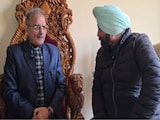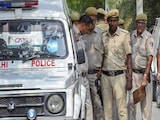Same-sex marriages cannot be termed urban elitist concepts just because more people from cities are coming out of the closet, the Supreme Court said today while hearing arguments seeking legal sanction for gay marriages.
The remark by Chief Justice of India DY Chandrachud was in response to the centre's submission that the petitions seeking gay marriage rights don't represent the views of the nation and that they reflect "urban elitist views". The centre does not have any data to show that this is an urban elitist concept, he said.
"State cannot discriminate against an individual on the basis of a characteristic over which the individual does not have control. When you see it as innate characteristics, then it counters (argument of) urban elitist concept... urban perhaps because more people are coming out of the closet. Government does not have any data also to show that same sex marriage is an urban elitist concept," said the Chief Justice of India.
The centre is opposed to the Supreme Court hearing the matter and has contended that only the legislature can decide on the creation of a new social relationship.
"In the question of personal laws, the Legislature is duty bound to act in accordance with the popular will. Where the social consensus favours a particular definition of Marriage, the Legislature in giving sanction to that form is only discharging its duty of adhering to the will of the people. This unequivocal democratic will should not be negated by a judicial order," it has said.
The centre has said that it would be relevant to "consider that what is presented before this Hon'ble Court is a mere urban elitist views for the purpose of social acceptance". "The competent legislature will have to take into account broader views and voice of all rural, semi-rural and urban population, views of religious denominations keeping in mind personal laws as well as and customs governing the field of marriage together with its inevitable cascading effects on several other statutes," it has said.
The bench, led by the Chief Justice of India, and comprising Justice SK Kaul, Justice Ravindra Bhat, Justice Hima Kohli and Justice PS Narasimha, is now hearing the petitioners' arguments.
Appearing for the petitioners, Senior Advocate Mukul Rohatgi said the notion of heterosexuality must be deconstructed.
He said fundamental rights guaranteed in Constitution were for all individuals, heterosexual or queer. So, there was no reason why they should be denied the right to marriage, he said.
"We will not be treated as lesser mortals and there will be full enjoyment of right to life," Mr Rohatgi argued.















